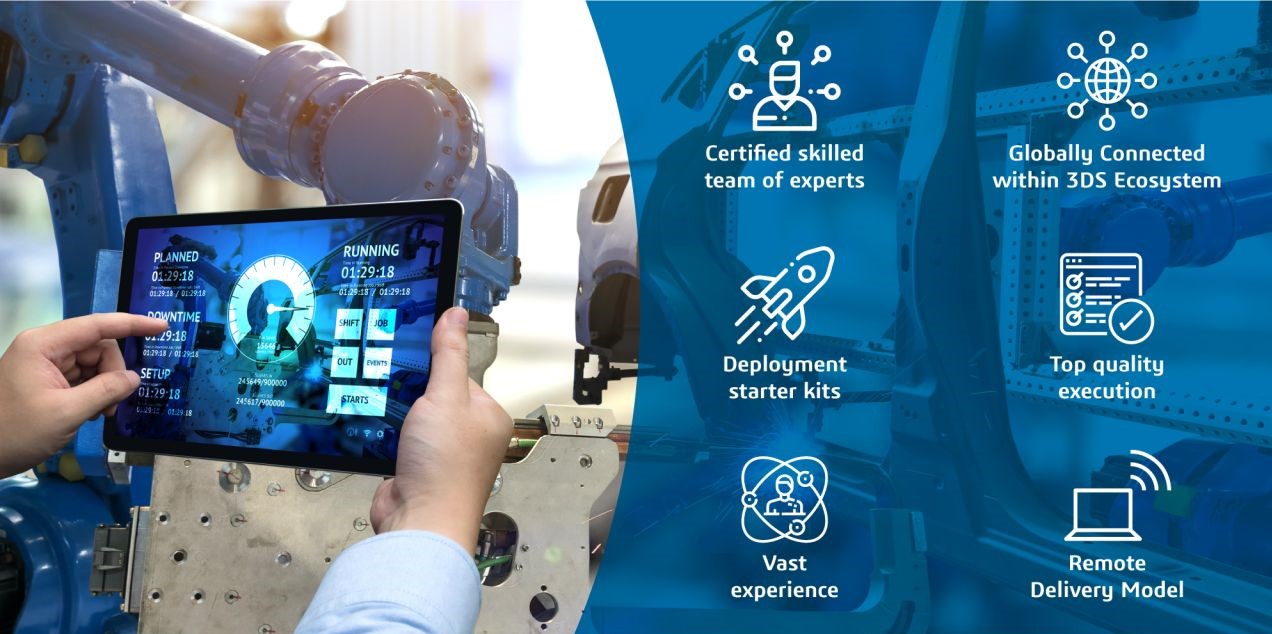KEY POINTS
- Industry Trends and Market Challenges in Manufacturing Space
- Additional Pressure Points in Emerging Economies
- MOM fitment and Dasssault Systemes DELMIA Apriso Solution
- Skepticism to Traditional MOM deployments, and our distinct DSGS Approach
- DSGS Advantages and Way Ahead
As global economies look towards shifting manufacturing from established hubs (China, Japan, Germany, North America) towards more emerging and resilient ones (South East Asia, India, Latin America, South Africa), we visit this trend, considering some of the challenges, disruptions, new ways and methods, and finally how technology and people can help our customers experience this transition.
Industry Trends in Manufacturing Space
Industry trends are now more dynamic and rapidly changing, demanding lot of flexibility from manufacturers. Some of the recent trends now set as default expectations are summarized below.

Market Challenges In Front of Manufacturing

What are the challenges that manufacturers are facing today?
- Re-use existing infrastructure and operations, example to support new and different products on same production lines
- Produce faster, increase throughput, improve quality, maximize efficiency
- Be Reliable, Reduce scrap (Relook at Reuse), optimize rework so that both time and effort can be decreased (e.g. runtime reassignment, planning and execution of product to a more suitable variant)
- Be flexible to Scale Up to meet sudden upsurge in demand, while keeping in mind redundancy and low utilization of resources during low demand cycles
- Key focus on global operations optimization of planning, scheduling, business processes, inventory, maintenance, breakdowns and bottlenecks internally, whereas agility in external partners, vendors, suppliers, and value networks is more than necessary, to achieve a total and holistic integration.
In emerging economies, manufacturers face additional challenges due to Cultural, Geo, Political or Competitive environments
- Quick turnaround times for product introduction, no complete or full release cycles
- Several parallel streams working simultaneously to crunch efforts/time and very small integration window for these towards the end
- Cost sensitivity is very high, whether towards manufacturing or by competition or eventual end customers
- Expectation of solutions that just work, no detailed trail or elongated test periods
- Workforce of future, skilled and IT aware,
- Collaborate more with customers, to consult, to standardize, to implement, and to fix. Remote working or far-way teams is still an unfamiliar and new concept for such people
- Ambitions define how to strategize: to be a global brand or engage more locally,
For further details, please visit our Manufacturing webpage
MOM playing key role in addressing the Manufacturing Challenges
 How does MOM fit in this situation? How can manufacturers take advantage of a modern approach to implement solutions that help them in real world?
How does MOM fit in this situation? How can manufacturers take advantage of a modern approach to implement solutions that help them in real world?
Traditionally evolving from point-fit or production executions solutions, todays MOM solutions are much more than MES, providing solution fitment for many of business processes and scenarios out of the box. Modern MOM solutions are tightly integrated within today’s IT landscape, through Digital Twin, PLM (EBOM and or MBOM), ERP, SCM or CRM solutions with expectation of more end-to-end solution continuity and improved feedback loops. Vendor/solution Inter-operability is a key factor, with emphasis towards smaller micro services architecture, cloud based or ready, ease of integration and data exchange rather than single monolithic or traditional 3-tiered architected solutions. Local Culture and Language, a rigid and Top Down Hierarchy IT expertise, Solution orientation
So what about Dassault Systèmes Manufacturing Operations Management solutions? (DELMIA and DELMIAWORKS, powered by the
3DEXPERIENCE® platform)
- Global manufacturing platform, across your enterprise, that provides visibility, control, and synchronization
- Pre-packaged apps and roles (Production, Quality, Warehouse, Maintenance and Time & Labor), synchronize engineering changes, support inventory and supply change
- Business Process Authoring, Deployments and Execution, COE based Unified Architecture for Processes, Data and User Interfaces enforcing governance with best practices
- Increase use of 3D models on production: work instructions, defect recording and tracking
- Both Business and Shop Floor Integrations: Message Bus, REST Web Services, Pub/Sub communication, OSISoft Integrations
- Compliance and Regulations built-in support, including GDPR
- Supports multiple manufacturing models, make to order/stock, Automated or Manual, Volume & Mix Variations
- Personalization and Security, Run on Desktop, Web or Mobile
- Nomad mode, build solutions that work in offline/disconnected mode
- Manufacturing Process Intelligence (MPI): KPI’s, Visibility and Analytics across plants and operations
Please visit our
DELMIA Apriso product page for further details.
Emerging economies/customers are skeptical to traditional DELMIA Apriso Deployments, but why?
Typically, successful deployments for DELMIA Apriso will need below (Waterfall) steps.
 Customers, especially in emerging markets, face multiple challenges during this traditional deployment process
Customers, especially in emerging markets, face multiple challenges during this traditional deployment process
- Accuracy in capturing the business requirement and translating them to IT requirements. Also defining clear objectives/goals, roles (primary/secondary), boundaries, handshakes and data exchanges within manufacturing IT landscape apps or solutions.
- Manual business process driven due to low labor cost, need orientation towards manufacturing business, IT setup and configurations (e.g. align/change existing processes, example labels, barcode scanning etc.)
- Design Thinking or Ability: Plan and create solutions that are scalable, reusable, modular, re-deployable
- Lack of DELMIA Apriso deployment skills and standard practice awareness availability at local geography
- Faster deployment cycle for either greenfield roll outs or brownfield enhancements/assimilations
So what is the DSGS approach, to deploy DELMIA Apriso readily and reliably?
We take you through a recent DSGS deployment example, implemented for a Hi-Tech manufacturing industry in an emerging geography. Some key highlights that helped to secure this difficult implementation are below :-
- DELMIA Apriso implementation for large business conglomerate in Vietnam. Establish relationship and trust at C-Level
- Customer Confidant: Mentor on Industry best practices, coordinate between solution vendors, harmonize customer business and IT, assist manufacturing objectives
- Complete implementation ownership: Blueprint requirements, Define Solution, Deployment to production lines, Product Trail Runs, and Post Go-Live Business/IT Support
- Quick starts rather built from ground up, pre-built accelerators support customer vision and ease of configuration
- Flexible delivery model (Iterative, CI/CD) as per dynamic business scenario in a very tight schedule. Sprints and storyboards to focus overall vision
- Synchronization with automation, SMT, packaging vendors achieving shop floor integrations and uniformity across multiple lines
- Audits, Reviews, Checklists along with deliverables to make informed Go/No Go decisions
- Customer Success: Top Three Smart Phone manufacturer in Vietnam within 1.5 years of project implementation
Who are we at DSGS and what is our Advantage for such repeated DELMIA Apriso implementations?
DSGS has contributed towards customer success across different industries. Our true differentiators are:

The Way Ahead
Emerging markets rather than exploring or re-inventing the wheel, can leverage the knowledge and experience at right cost with fruitful partnerships. This will uplift their internal ambitions and be externally competitive, staying ahead in this manufacturing game.
As we say and believe in DELMIA world – MAKE IT HAPPEN (For you, with us)
Ambarish SHENDRE
(DELMIA Apriso Senior Manager)
Pramod BIRADAR
(DELMIA Apriso Senior Manager)
IN.DSGS.Marketing@3ds.com
To know more contact






